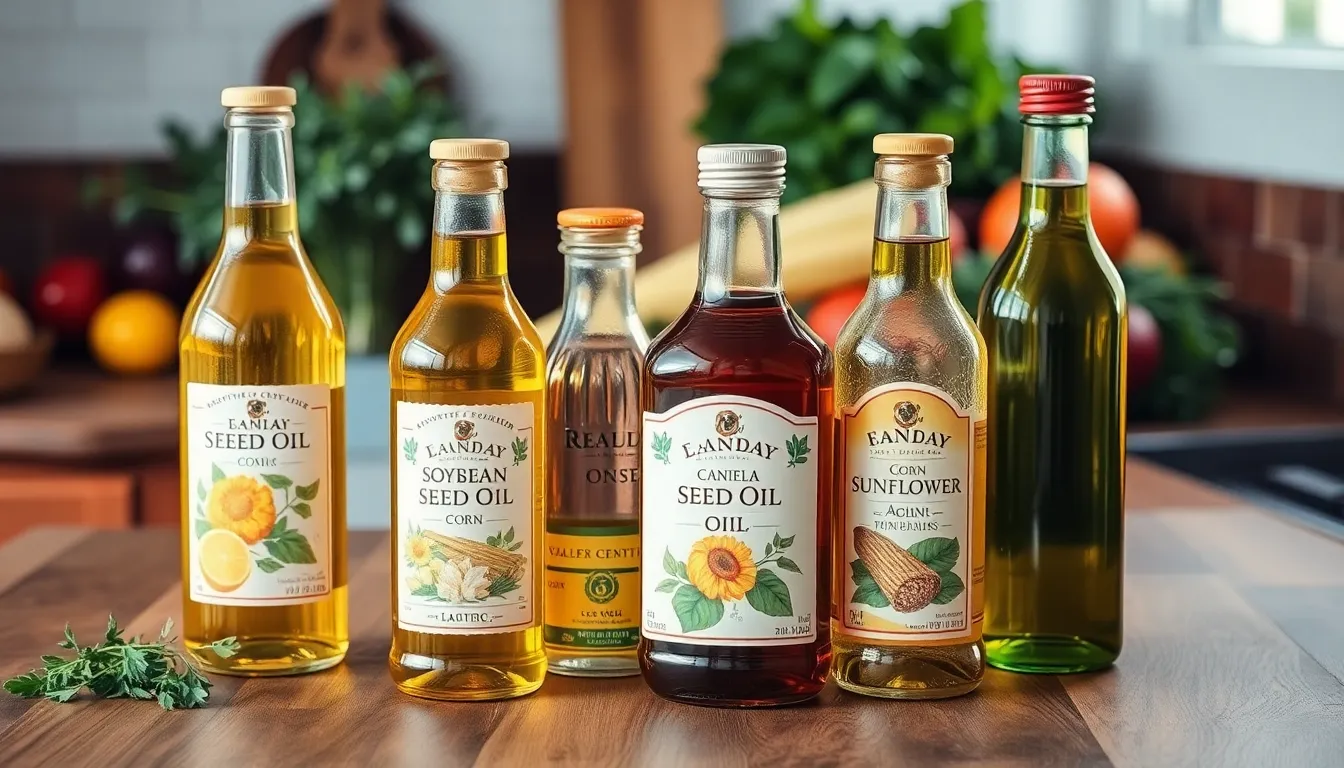In today’s health-conscious world, seed oils have become the go-to for many home cooks. But not all oils are created equal. Some can turn a simple salad into a slippery slope of health risks. Imagine pouring a little liquid regret on your greens—yikes!
Table of Contents
ToggleUnderstanding Seed Oils
Seed oils have gained traction among home cooks seeking healthier options, yet their safety and health implications vary. Certain oils pose health risks that can affect overall well-being, even in simple meals such as salads.
What Are Seed Oils?
Seed oils originate from various plant seeds and are often used for cooking and food preparation. These oils undergo a process of extraction and refinement to enhance their stability and flavor. Typically high in polyunsaturated fats, many seed oils contain omega-6 fatty acids, which can lead to health concerns when consumed excessively.
Common Types of Seed Oils
Common seed oils include canola, soybean, sunflower, and corn oil. Canola oil, for instance, is widely used for frying and baking due to its neutral flavor. Soybean oil appears frequently in processed foods and salad dressings. Sunflower oil, known for its high smoke point, is popular among chefs for high-heat cooking. Lastly, corn oil stands out for its affordability and versatility in various culinary applications. Each type has unique properties and health implications that warrant attention.
Health Concerns Associated with Seed Oils

Seed oils are popular in modern cooking, yet they can pose various health risks. Awareness of these health concerns is essential for making informed dietary choices.
High Omega-6 Fatty Acids
High levels of omega-6 fatty acids characterize many seed oils. Canola and soybean oils contain significant amounts, which can disrupt the body’s omega-3 to omega-6 ratio. An imbalance in this ratio can initiate chronic inflammation and increase the risk of diseases like heart disease and obesity. Consuming omega-6 fatty acids excessively also limits the beneficial effects of omega-3 fatty acids, found in sources like fish and flaxseed.
Potential Inflammatory Effects
Inflammatory responses can arise from high omega-6 fatty acid intake. Overconsumption of seed oils may trigger processes associated with various inflammatory conditions. Regular use of oils such as corn and sunflower introduces compounds that may promote inflammation. Chronic inflammation can lead to serious health issues, including diabetes and arthritis, diminishing overall well-being.
Processing Methods
Processing methods for seed oils raise additional health concerns. Many oils undergo refining, which involves chemical solvents and high heat. This process depletes beneficial nutrients and creates harmful trans fats. Nutrient loss during extraction contributes to a lack of health benefits, making unrefined oils a better choice. Avoiding highly processed seed oils supports healthier dietary habits and overall health.
Seed Oils to Avoid
Certain seed oils pose health risks and should be approached cautiously. Here are some of the most concerning options.
Canola Oil
Canola oil contains high levels of omega-6 fatty acids, which can lead to an imbalance in the body’s nutrient intake. This imbalance disrupts the omega-3 to omega-6 ratio, potentially triggering chronic inflammation. Health conditions linked to this include heart disease and obesity. Additionally, processing methods often involve refining that strips valuable nutrients while producing harmful trans fats. These factors make canola oil a less desirable option for cooking.
Soybean Oil
Soybean oil is prevalent in many processed foods, yet its omega-6 fatty acid content raises significant health concerns. An excess intake contributes to inflammatory processes, connecting it to diseases such as diabetes and arthritis. Commonly used in fried foods and snacks, soybean oil is often highly refined, which diminishes its nutritional quality. The potential negative health implications associated with soybean oil prompt many health advocates to recommend limiting its consumption.
Corn Oil
Corn oil features a high omega-6 fatty acid concentration, leading to similar health risks as canola and soybean oils. This imbalance can heighten inflammation levels and increase the risk of chronic diseases. When used in cooking or food preparation, corn oil often undergoes extensive processing that removes beneficial compounds. Given these processing methods and their health implications, minimizing the intake of corn oil is advisable for better health outcomes.
Alternatives to Consider
Choosing the right oils and foods can support overall health. Exploring healthier options can significantly reduce the risks associated with seed oils.
Healthier Cooking Oils
Extra virgin olive oil stands out due to its rich antioxidant content and heart-healthy fats. Avocado oil shines with its high smoke point, making it suitable for various cooking methods. Coconut oil offers a unique flavor and medium-chain triglycerides, which may boost metabolism. Ghee, a clarified butter, enhances dishes while providing beneficial fatty acids. Using these alternatives helps maintain an optimal omega-3 to omega-6 ratio, promoting better health outcomes.
Benefits of Whole Foods
Whole foods provide essential nutrients that promote overall wellness. Fruits and vegetables pack vitamins, minerals, and fiber, supporting healthy digestion and immune function. Choosing grains like quinoa and brown rice delivers complex carbohydrates and prevents spikes in blood sugar. Lean proteins from sources like chicken, fish, and legumes contribute to muscle health and sustain energy. Selecting whole foods enhances dietary quality and helps prevent health issues linked to refined ingredients and excessive omega-6 intake.
Being mindful of the oils used in cooking is crucial for maintaining health. The potential risks associated with certain seed oils can’t be ignored. High omega-6 fatty acids in oils like canola and soybean can lead to chronic inflammation and other serious health issues. By opting for healthier alternatives such as extra virgin olive oil or avocado oil, individuals can promote better overall well-being. Making informed choices about cooking oils and prioritizing whole foods can significantly enhance dietary quality and reduce health risks. Staying educated about these oils empowers individuals to take charge of their health.






